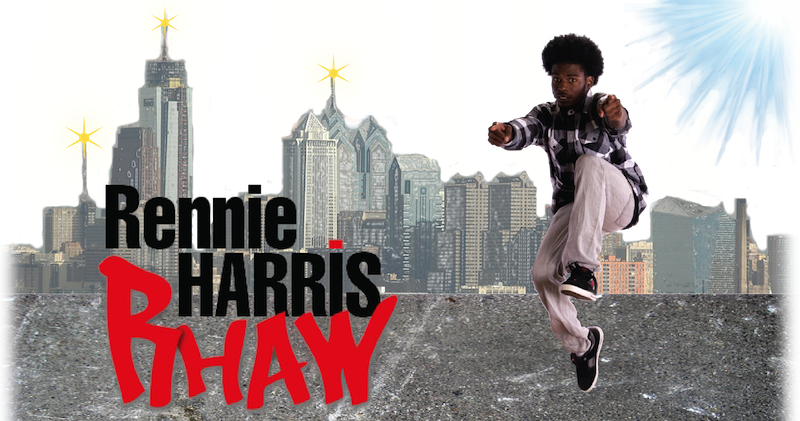

(Founder, Artistic Director, Choreographer and Director). Dr. Lorenzo (Rennie) Harris was born and raised in an African-American community in North Philadelphia. Since the age of 15, Dr. Harris has been teaching workshops and classes at universities around the country and is a powerful spokesperson for the significance of “street” origins in any dance style. In 1992 Harris founded Rennie Harris Puremovement, a hip hop dance company dedicated to preserving and disseminating hip hop culture through workshops, classes, hip-hop history lecture demonstrations, long term residencies, mentoring programs and public performances. Harris founded his company based on the belief that hip hop is the most important original expression of a new generation. With its roots in the inner-city African-American and Latino communities, hip hop can be characterized as a contemporary indigenous form, one that expresses universal themes that extend beyond racial, religious, and economic boundaries, and one that (because of its pan-racial and transnational popularity) can help bridge these divisions. Harris’ work encompasses the diverse and rich African-American traditions of the past, while simultaneously presenting the voice of a new generation through its ever-evolving interpretations of dance. Dr. Harris is committed to providing audiences with a sincere view of the essence and spirit of hip hop rather than the commercially exploited stereotypes portrayed by the media.
In Dr. Harris’ own words, these are his earliest dance memories:
I was first inspired by Don Campbell’s group, “The Campbell Lockers.” I remember seeing them on TV when I was in 4th and or 5th grade. I remember my mom making me a Knicker Bocker set because that’s what Don and his group wore. If you don’t know what knickers are, they are shorts with pegged hems, so to speak. It was really Don Campbell who inspired me, although at the time I had no idea that he affected me in such a way. I also remember, around the same time, dancing in a line dance at a girl’s birthday party and having people say out loud, “he’s a good dancer.” After that I don’t remember dancing again until I was about 12-13 years old. This is when I started a group called Cobra III with my brother and my childhood friend nicknamed “Brainy.” We entered a church talent show and won it. That was really the beginning. I had on green pinstriped pants with colored suspenders, white gloves and a bow tie. I thought I was hot shit….”
Hip hop dance became a part of everyday life for Harris. As a teen-ager, he founded and captained ensembles such as the Step Masters, The Scanner Boys, and for a brief stint of time was a member of the Magnificent Force (NY). The Scanner Boys were an innovative hip hop dance group that pioneered Philadelphia hip hop movement in the early 80s. In 1992 the Scanner Boys performed for the last time at “Dancing in the Streets” at 30th Street Station in Philadelphia. Dr. Harris then formed Rennie Harris Puremovement. Currently, Harris tours three evening-length works and a collection of repertory works from the last 15 years of Rennie Harris Puremovement. Rome & Jewels, the first evening-length work choreographed and directed by Rennie Harris, uses Shakespeare’s text, in addition to original material contributed by the cast, to tell its own story based on West Side Story and Romeo and Juliet. To date Rome & Jewels is the longest touring hip hop dance theater work in American history with three Bessie Awards, two Black Theater Alvin Ailey Awards, a Herb Alpert award and a nomination for a Lawrence Olivier Award (UK). Rome & Jewels has performed for sold-out audiences nationally and internationally. The Philadelphia Inquirer wrote of the work, “Harris has built a wedge that will open the doors of America’s art centers, displaying hip hop as clear cultural expression, compelling to all races and generations…” and Rome & Jewels is clearly the work of an artist of uncommon vision…we get to witness, right here in our city, the evolution of an important new dance form.” More important than the critics’ response has been the outpouring of support from each community to which the company travels. Rome & Jewels is a highly successful teaching tool for the company. Because the work is so diverse, fusing classical text with hip hop vocabulary, and mixing hip hop music with rock, modern and classical sounds, the work has the power to touch many different lives. On each new tour the company offers a series of outreach activities, either lecture demonstrations or discussions, with youth from elementary school through college age. These activities are aimed at opening up dialogue about racism and other areas of discrimination, and teach respect and appreciation for hip hop culture.
In addition, Harris has Legends of Hip hop, Students of the Asphalt Jungle (collection of repertory works) and Facing Mekka. In Facing Mekka Harris continues his quest to present hip hop dance on the concert stage and to challenge assumptions about what hip hop dance is. To this end, he has developed a solo that challenges his own choreographic experiences and audiences’ expectations of hip hop. Harris approaches the vocabulary of this work, entitled Lorenzo’s Oil, as a butoh-style hip hop dance. The solo is meant to integrate calming, serene space (represented by the butoh style) with hip hop. Lorenzo’s Oil turns hip hop on its head in order to draw attention away from the spectacle and acrobatic and high powered movements that many audiences, particularly those outside of hip hop movement, expect, and see what it could/should be.
Much of Dr. Harris’ work up to and including Rome & Jewels has explored his personal experiences as an African-American male growing up in North Philadelphia. While this male point of view has always been a source of strength for Harris, in Facing Mekka he wanted to explore hip hop movement and how women interpret and present this movement. Dr. Harris has made it their own. What is most fascinating to Dr. Harris is how they have infused his movement with their own sense of dynamics and qualities. This section is a counter-balance from the natural machismo of hip hop dance and a chance for Dr. Harris and his dancers to explore how women translate hip hop movement. Thematically, this section explores the universality of movement and reflects upon the unifying power of dance. Harris returns here to the ideas of “puremovement” and seeks to challenge those who see hip hop as a purely male form of expression. While Facing Mekka takes traditional hip hop vocabulary and challenges assumptions and ideas about it, Harris’ other work, Legends Of Hip Hop, seeks to honor and preserve the tradition of hip hop dance. Legends, as it is affectionately called, has long been a dream of Harris’. It is a gathering of the legends of hip-hop dance teaching their art, leading the next generation of hip hop dance artists, and documenting and preserving their work. The festival began in 1997-98 when guest artists and students came from around the world to Kumquat Dance Center in Philadelphia, PA, for a week of classes, lecture demonstrations, panel discussions, jam sessions and performances. The guest artists and teachers are seminal performers in hip hop dance. Teachers have included Don Campbell (creator of Campbell Locking i.e. Locking), Boogaloo Sam (creator of Boogaloo & Popping) and the Electric Boogaloos (pioneers of boogaloo and popping), Crazy Legs and Lil Lep of the infamous Rock Steady Crew (pioneers of B-boying), among many others. Harris has also begun touring the festival; the first pilot tour took place July 15-21, 2001 at the Colorado Dance Festival. Harris’ goal is to tour video documentation, exhibits, and a supplemental book, all of which celebrate the rich history of hip hop dance. Legends is part of an ongoing effort by Dr. Harris to document the roots of the countless hip hop styles, but he acknowledges that developing an accurate history will not be easy. ‘Most of the ones who innovated in the dance are either locked up or were murdered in the streets.’
Dr. Rennie Harris, throughout his history, has established a strong reputation for innovative and exciting classes and workshops for children, beginning with his own involvement, at the age of 14, with the Smithsonian Institution via the Philadelphia Folk Life Center. The company is currently seeking to implement an after-school mentoring program for children in the company’s home city of Philadelphia. The After School/Mentoring program had a pilot phase that was implemented in the fall 2000 and was a 4-6 week program at community centers and schools throughout Philadelphia. RHPM company members were assigned to these centers and taught hip hop dance and culture to children throughout the city who might otherwise not have such opportunities. This program provided structured and constructive activities for at-risk youth, encouraged creativity and literacy, and built self-confidence. It is amazing to see the way children respond to learning hip hop dance and culture, in all its forms. By seeing the rich history of the culture they develop a new respect for it and in turn for themselves, as they see their role within hip hop.
Dr. Harris’ artistic philosophy reflects a deeper humanitarian vision that we as a universe of people can never overcome racial or ethnic barriers without knowing and respecting our own distinct cultures. Harris grew up entrenched in hip hop as an African-American and Latino art form, in all its forms -- music, dance and language. Harris has embraced the culture and sought to honor the legacy of hip hop. He truly believes that hip hop is the purest form of movement in that it honors both its heritage from African and African American-Latino forms, and honors the individual. Dr. Harris is well-versed in the vernacular of hip hop which includes the various techniques of B-boy (misnomer break dancing), house dancing, stepping and other styles that have emerged spontaneously from the inner cities of America like the North Philadelphia community in which he was raised. He has brought these "social" dances to the concert stage, creating a cohesive dance style that finds a cogent voice in the theater. He is a powerful spokesperson for the significance of "street" origins in any dance style. Intrigued by the universality of hip hop, he seeks inspiration from other forms and performance art. Harris was voted one of the most influential people in the last one hundred years of Philadelphia history and has been compared to twentieth-century dance legends Alvin Ailey and Bob Fosse. Harris has been awarded the key to the cities of Miami and Philadelphia, and featured in Rose Eichenbaum’s Masters of Movement-Portraits of America’s Great Choreographers with dance legends such as Carmen de Lavallade, Judith Jamison, Fayard Nicolas and Gregory Hines. In addition, he was recently awarded a medal from the Kennedy Center (DC) as a master of African American Choreography. Harris recently was awarded Kulu Mele’ African Rooted Dance award, Governor’s Artist of the Year At 45, Philadelphia Rocky Award (peer), The United States Artist Fellowship award and The Harman Shakespeare Theater award for Adaptation of West Side Story and Romeo & Juliet. Dr. Lorenzo "Rennie" Harris is atop the hip hop heap, its leading ambassador.